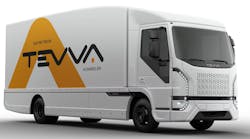I could never be a diplomat. Apparently, I roll my eyes at inopportune times and don’t even realize it. Ask my wife. She loves me; even so, I occasionally have to duck.
Fortunately, I wasn’t assigned to travel to COP28, the handy name for the latest UN Climate Change Conference held last month in Dubai. So, I did not unwittingly create an international incident by making a face.
But I have spent way too much time reviewing the speeches, sessions, reports, and press releases that pertain to the adoption of zero-emission commercial vehicles so you, our readers, don’t have to.
The gist: The world leaders and international organizations that make themselves heard at such events are incredibly optimistic. For some equipment manufacturers and their customers: not so much.
Looks good on paper
Participating in an early COP28 session, “Accelerating the Transition Through Road Transport,” British electric truck builder Tevva pulled no punches.
“It’s no secret that Tevva has had its challenges this year—similar to many startups in the EV space who have faced and continue to face several obstacles to mass production,” said Stuart Cottrell, head of energy services and government partnerships at Tevva. “Volta Trucks filed for bankruptcy due to supply chain issues, although there is hope for them on the horizon. North American startups are burning through cash reserves as they struggle to ramp up production in the face of dwindling funding options.”
Tevva then pointed a finger directly at the post-Brexit British government, suggesting that its funding support for the EV shift isn’t competitive with some in the EU, even as the United Kingdom has set even more ambitious clean transport targets.
See also: A pesky EV question keeps coming up
And while the goal “looks good on paper,” the adoption of clean trucks “won’t play out on paper”—instead, in company boardrooms and with fleet decision-makers.
“What good are ambitious targets if you don’t have the policies or appropriate measures in place to see them achieved?” Tevva argued. “As the U.K. has the most ambitious targets for battery-electric truck adoption, you’d think that the most attractive incentives would also be in place to stimulate demand, especially as we’re no longer bound by EU state aid rules limiting the amount of support governments can give specific industries.”
The statement characterized the U.K. financial incentives as “paltry,” citing a maximum discount of £16,000 ($20,263.84) for a battery-electric truck. But in Germany, for example, the government provides 80% of the price differential between diesel and battery-electric trucks; in the Netherlands, it’s 45%.
Similarly, while Germany is already building charging infrastructure along major trucking lanes, in the U.K., “you’d struggle to find a single dedicated electric truck charging facility” on common freight routes.
“No one said the electrification of trucks was going to be easy, but it is inevitable, and the technology has developed to a point where an electric truck is a viable proposition for many fleet operators,” Tevva concluded. “Yet our ambitious targets in the U.K. are not backed up by the right actions to enable, incentivize, and de-risk the shift. It is imperative that these actions and policies are put in place to facilitate the journey to net zero, by this government or the next.”
Talk isn’t cheap
Timed for COP28, the ZEV Transition Council published its Roadmap to 2030 Enabling a Global Transition to Zero-Emission Vehicles, outlining the “collective actions” needed to accelerate the transition to ZEVs in emerging markets and developing economies “to help make ZEVs the most affordable, accessible, and attractive option in all regions by 2030.”
I can say this since I’ve lived in Little Rock for 30 years: Arkansas (and other less-progressive states) likely won’t have accessible and attractive ZEV options in 2030, much less those less-developed economies.
Here’s the thing: As Tevva contends, the pace of ZEV transition is a matter of money (and political priorities) more so than one of technological obstacles.
Speaking at the COP28 Green Climate Fund event on “Scaling up Access and Impact,” UN Climate Change Executive Secretary Simon Stiell couldn’t have said it more plainly: “Finance is the great enabler of climate action.”
Globally, he noted that a small group of countries have provided the bulk of funding for such initiatives—and that must change.
“More countries should see it in their interest to contribute,” Stiell said. “We need to get away from the notion that funding for developing countries is ‘charity,’ or ‘development aid.’ As long as we think of climate funding this way, it remains vulnerable. It can be cut as soon as domestic political considerations dictate it.”
Haves and have-nots
A generation ago, UN policy was driven rhetorically by addressing the divide between “haves” and “have nots.” The debate has since evolved around “equity,” but it’s the same argument.
“Climate change does not care about north or south, and neither should we,” Stiell concluded. “We are in the same leaking boat, and those who have several life jackets must provide some to the others.”
Granted, that sounds a lot like a call for the charity Stiell wants to get away from, but let’s give him the benefit of the doubt.
But he’s flat wrong to make the ZEV transition a rich-versus-poor issue. In democratic societies, it’s a purely political issue: Is the effort worthy of taxpayer support? And, for much of the developed West, impactful public policy is decided on a nation-by-nation, province-by-province, and even municipality-by-municipality basis.
And that will lead to a whole different set of haves and have-nots. Ask Tevva.
To get away from such divisions and to get back to trucking, under the Memorandum of Understanding (MOU) on Zero-Emission Medium- and Heavy-Duty Vehicles, leading countries commit to working together to enable 100% zero-emission new truck and bus sales by 2040 with an interim goal of 30% zero-emission vehicle sales by 2030 to facilitate achievement of net-zero carbon emissions by 2050. The U.S., Canada, and several European nations have signed on. But, essentially, it’s just a pledge to play nice and keep in touch.
For more details, our friends at GNA (ZEV optimists, but optimists with a plan and a track record) have a nice little roundup, North America Makes a Splash at COP28, on the ACT News page.






